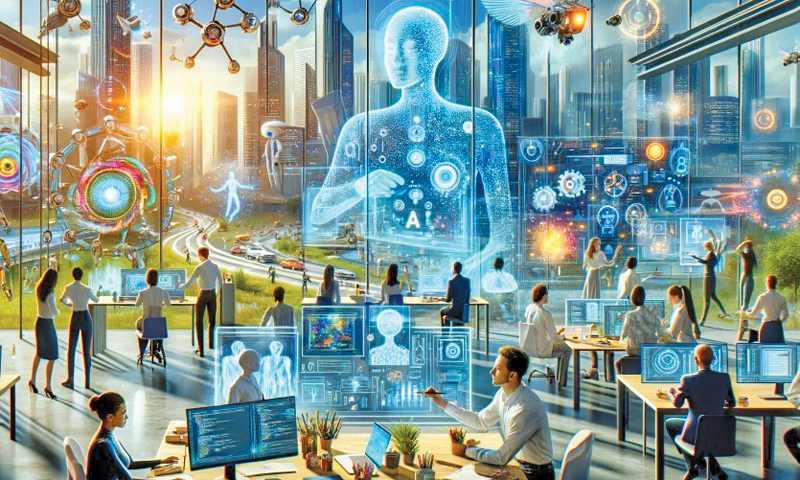Artificial intelligence (AI) is no longer the stuff of science fiction. It’s right here influencing our daily lives in every passing minute. AI has become a silent yet powerful force shaping the modern world from the way we work to how we interact and live. Its presence is both exhilarating and unsettling as it offers possibilities we couldn’t have imagined a decade ago. But what exactly does this transformation look like?
Redefining the workplace
In any workplace, AI is not a mere a tool; it’s a game-changer. Across industries, it’s reshaping jobs and creating new opportunities while simultaneously making others obsolete. Across the globe, businesses use AI to automate repetitive tasks, analyse data at lightning speed, and improve efficiency. Applications such as customer service chatbots, predictive analytics in marketing, or automated inventory systems save time and reduce human error, giving companies a competitive edge.
It is vital to note that the integration of AI doesn’t stop at efficiency. It’s enabling workers to focus on more creative and strategic aspects of their roles. For example, architects can rely on AI-driven design tools to model buildings faster, leaving more time for innovation. Likewise, doctors now use AI for diagnosing diseases with unprecedented accuracy, transforming healthcare into a more personalised and precise field.
Yet, the rise of AI also sparks anxiety. Many fear that automation will lead to job losses, especially in industries like manufacturing, logistics, and retail. While it’s true that some roles will disappear, AI is also creating demand for new skills. Jobs in AI development, ethical programming, and robotics are growing rapidly. The challenge lies in adapting, reskilling, and ensuring that people are equipped to thrive in this evolving landscape.
AI in everyday life
AI’s influence isn’t limited to offices or factories—it’s everywhere. Voice assistants such as Siri or Alexa rely on AI to answer questions, play music, and control smart devices in your home. Netflix recommends movies based on what you’ve watched, while shopping platforms predict what you might want to buy next. These conveniences are powered by algorithms that learn human preferences, making daily tasks easier and more enjoyable.
AI in transportation
Transportation is another area where AI shines. Self-driving cars, once a futuristic fantasy, are becoming a reality. Companies like Tesla are pushing boundaries with vehicles that can navigate roads using AI-powered sensors and cameras. AI is also behind the navigation apps that provide real-time traffic updates, saving us time and frustration on our commutes.
But what we should know is that convenience comes at a cost. The more we rely on AI, the more data we share. From our online searches to our shopping habits, AI systems thrive on data to improve their performance. This raises concerns about privacy and how companies use our information. Striking a balance between leveraging AI’s benefits and safeguarding personal data is a challenge society must address.
Revolutionising communication
AI has certainly redefined how we communicate, connecting people across the globe in ways that were unimaginable a few decades ago. Translation apps powered by AI make it easy to break down language barriers. AI ensures your message gets across wherever you go – whether you are a local or global traveller.
Social media platforms rely heavily on AI to curate content, recommend connections, and filter out harmful material. Algorithms decide what appears on your feed, tailoring the experience to your interests. While this personalisation keeps us engaged, it also creates echo chambers, where we’re exposed only to ideas and opinions that align with our own. This can limit critical thinking and deepen societal divides.
AI also plays a role in creative communication. Tools like ChatGPT or DALL-E generate text and images, opening up new possibilities for storytelling, marketing, and education. These innovations are fascinating, but they also blur the lines between human creativity and machine-generated content. As AI-generated art, music, and literature become more common, society must grapple with questions about authenticity and ownership.
Future of AI
The future of AI is as exciting as it is uncertain. Its potential to solve global problems is immense. In medicine, AI is already being used to identify cancerous cells and develop new treatments. In environmental science, it helps predict weather patterns and track deforestation. As these technologies evolve, they could play a critical role in addressing climate change, improving disaster response, and creating sustainable solutions for a growing population.
However, this future isn’t without challenges. Ethical concerns loom large. Who decides how AI should be used? How do we prevent biases embedded in algorithms from perpetuating inequality? What happens when machines surpass human intelligence in certain areas? These questions demand thoughtful answers as AI continues to advance.
Another pressing issue is accessibility. While AI holds promise for improving lives, its benefits aren’t evenly distributed. Wealthier countries and corporations dominate AI research and development, leaving others at risk of falling further behind. Bridging this gap is crucial to ensuring that AI’s advantages are shared globally, rather than exacerbating existing inequalities.
AI has brought us to a turning point in human history. It’s transforming how we work, live, and communicate at a unique pace. While the changes it brings are enormous, what we should not forget is that they’re not without complications. It is the responsibility of us, the humans to make use of AI responsibly, ensuring that it enriches lives rather than undermining them. The choices we make today will shape the world of tomorrow, making this an era of great responsibility as well as great possibility.









